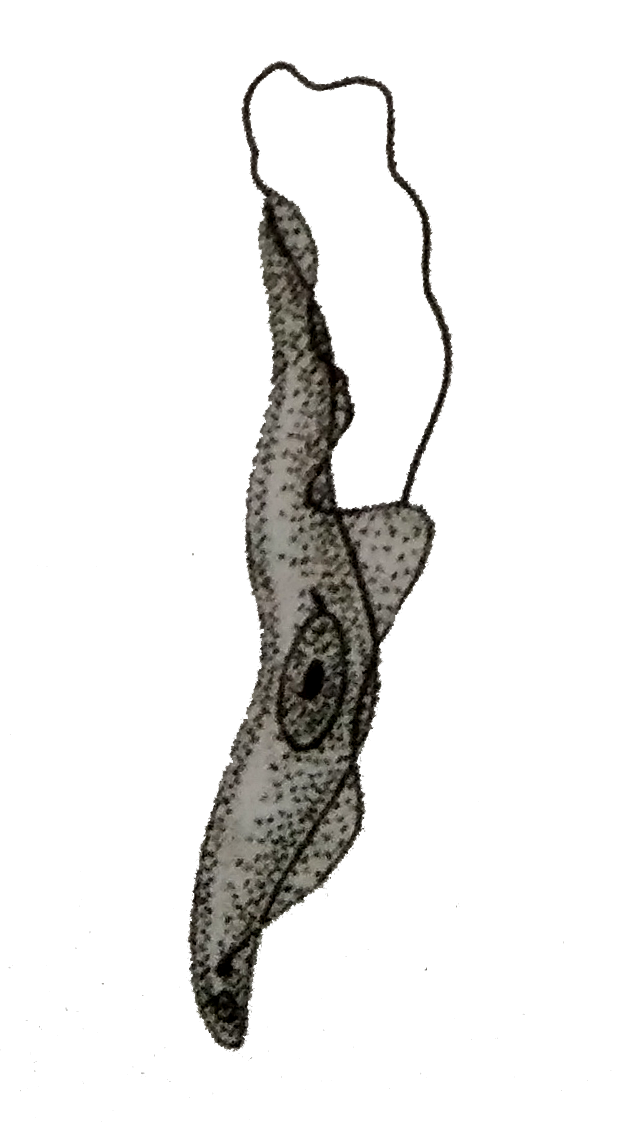Sporozoan protists are
Parasitism
Without locomotory organs
With pseudopodia
Both A and B.
The correct Answer is:D
Step-by-Step Solution:
1. Understanding Sporozoan Protists:
- Sporozoan protists are a group of unicellular organisms that are primarily known for their parasitic lifestyle. They belong to the phylum Apicomplexa.
2. Characteristics of Sporozoans:
- These organisms do not have locomotory organs such as cilia or flagella. Instead, they rely on their hosts for movement and transmission.
- They reproduce through a process called sporogony, which produces spores that can infect new hosts.
3. Infective Stage:
- The spore is the infective stage of sporozoans. For example, the genus Plasmodium, which causes malaria, has a spore-like stage known as the sporozoite that is transmitted through mosquito bites.
4. Parasitism:
- Sporozoans exhibit parasitism, meaning they live on or in a host organism and derive nutrients at the host's expense. This is a defining characteristic of sporozoans.
5. Evaluating the Options:
- Option A: Parasitism - This is correct as sporozoans are parasitic.
- Option B: Without locomotory organs - This is also correct since sporozoans do not have specialized structures for movement.
- Option C: With pseudopodia - This is incorrect as pseudopodia are characteristic of amoeboid organisms, not sporozoans.
- Option D: Both A and B - This is the correct choice since both statements about sporozoans are true.
6. Conclusion:
- Therefore, the correct answer is Option D: Both A and B.
- Sporozoan protists are a group of unicellular organisms that are primarily known for their parasitic lifestyle. They belong to the phylum Apicomplexa.
- These organisms do not have locomotory organs such as cilia or flagella. Instead, they rely on their hosts for movement and transmission.
- They reproduce through a process called sporogony, which produces spores that can infect new hosts.
- The spore is the infective stage of sporozoans. For example, the genus Plasmodium, which causes malaria, has a spore-like stage known as the sporozoite that is transmitted through mosquito bites.
- Sporozoans exhibit parasitism, meaning they live on or in a host organism and derive nutrients at the host's expense. This is a defining characteristic of sporozoans.
- Option A: Parasitism - This is correct as sporozoans are parasitic.
- Option B: Without locomotory organs - This is also correct since sporozoans do not have specialized structures for movement.
- Option C: With pseudopodia - This is incorrect as pseudopodia are characteristic of amoeboid organisms, not sporozoans.
- Option D: Both A and B - This is the correct choice since both statements about sporozoans are true.
- Therefore, the correct answer is Option D: Both A and B.
Topper's Solved these Questions
- KINGDOM PROTISTA (UNICELLULAR EUKARYOTES)BOOK - DINESH PUBLICATION ENGLISHCHAPTER - KINGDOM PROTISTA (UNICELLULAR EUKARYOTES)EXERCISE - CHECK YOUR GRASP
19 Videos
- KINGDOM PROTISTA (UNICELLULAR EUKARYOTES)BOOK - DINESH PUBLICATION ENGLISHCHAPTER - KINGDOM PROTISTA (UNICELLULAR EUKARYOTES)EXERCISE - CHECK YOUR GRASP
19 Videos
- KINGDOM PLANTAE OR METAPHYTA BOOK - DINESH PUBLICATION ENGLISHCHAPTER - KINGDOM PLANTAE OR METAPHYTA EXERCISE - CYG
20 Videos
- LEAFBOOK - DINESH PUBLICATION ENGLISHCHAPTER - LEAFEXERCISE - CYG
10 Videos
Similar Questions
Knowledge Check
Identify the given figure of a protozoan protist and select the correct option.
 Aentamoeba histolyticaBPlasmodium vivaxCGiardia intestinalisDTrypanosoma gambiense
Aentamoeba histolyticaBPlasmodium vivaxCGiardia intestinalisDTrypanosoma gambienseWhich of the following is a material from which cell walls or shells of various protists are composed ?
AGlycogenBFloridean starchCAlginic acidDLeucosinCasaual organisms of sleeping sickness and kala-azar belong to which of thefollowing groups of protozoan protists?
AAmoeboid protozoansBFlagellated protozoansCCiliated protozoansDSporozoans
The digestion of food in all protozoan protists is .......
View SolutionThe protists have
View SolutionCompare any four important characteristics in various protozoan protists.
View SolutionWhich group of protists have a very high number of chromosomes ?
View SolutionSporozoans do not have
View Solution
